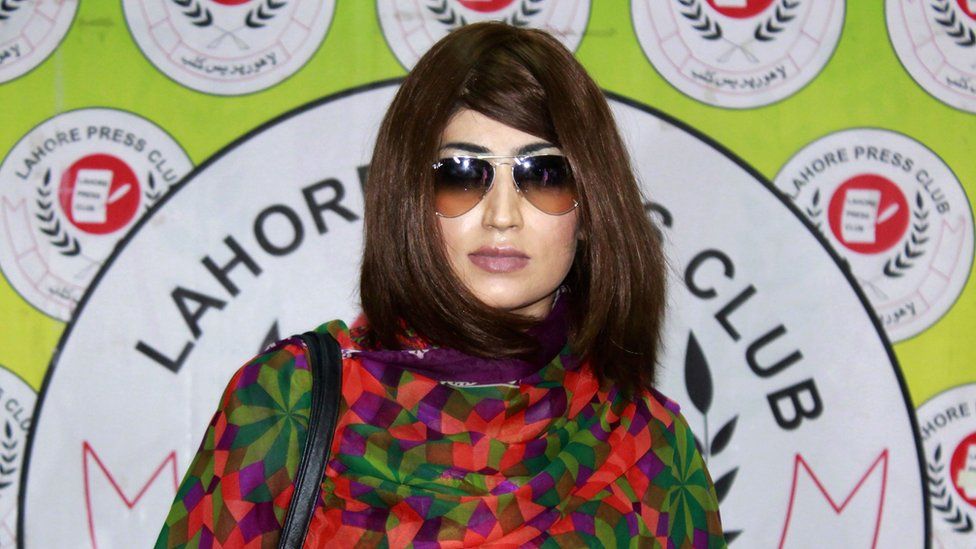Qandeel Baloch: A YouTube star and the cleric linked to her death
- Published

In July last year, a Pakistani social media star, Qandeel Baloch, was strangled to death at her home in Multan.
The 26-year old was famous for her bold, risque YouTube posts which had challenged Pakistan's conservative values.
Her brother is among those on trial for carrying out the so-called honour killing, though justice is taking a long time to come.
In a dramatic development this week, an influential religious scholar - who had met her only days before she died - was also arrested in connection with her death.
Who was Qandeel Baloch?
From a humble background in rural Punjab, Qandeel Baloch burst onto the social media scene in 2013, posting videos, revealing pictures and comments online.
This instantly made her a controversial figure among those who saw her actions as going against the norms of society in the conservative Muslim country.
Qandeel Baloch had a reputation for being Pakistan's first social media celebrity
But she was also praised for her fearlessness, for breaking strict social taboos and expressing herself the way she wanted to.
She was often called the Kim Kardashian of Pakistan, reaching fame overseas. In 2015, she was reported to be one of the top 10 most searched Pakistani personalities.
Her supporters often warned her that her behaviour could threaten her life.
The model and the mullah
- Part Two: 'Pakistan's Kim Kardashian'
- Part Three: 'The naming and shaming of a sex symbol'
Who is Mufti Abdul Qavi and how did he know her?
He was a renowned Islamic religious scholar with political connections. He was a member of an important government "moon-sighting" committee which helps determine the start date of Islamic festivals.
The mufti was often invited on to TV programmes where he opined on various religious and social issues, and in June 2016, he appeared in a show alongside Qandeel Baloch, who was on video-link.
This programme was about people who criticised Ms Baloch for her online behaviour and the host wanted to get the opinion of the scholar on the issue.
But, instead of criticising her, Mufti Abdul Qavi, seemingly out of nowhere, invited Ms Baloch to meet him in Karachi where he was due to attend a moon-sighting event. She replied that it would be an honour to meet him.
She took up the offer a few weeks later, on 20 June, later posting several suggestive selfies on social media with him. In one she was wearing his signature sheepskin cap.
This time, criticism also landed on the mufti. He was widely accused of behaving inappropriately by associating with a disreputable woman.
Even worse, it all happened in the middle of Ramadan, the holy month when Muslims fast during the day and are supposed to "shield their eyes" from looking at women who are not their immediate relatives.
He was humiliated and his membership of the Moon-Sighting Committee was revoked.
Why is he now heading to court?
Less than a month after she met the cleric, Ms Baloch was dead.
Qandeel's brother, Wasim, said initially that he had killed her himself because she was bringing a bad name to the family.
He and two alleged accomplices were charged with murder. All three later pleaded innocent - their trials are yet to begin.
But Ms Baloch's family also pointed the finger at Mufti Abdul Qavi, saying he had instigated the murder.
Her parents said that, being an influential religious scholar with hundreds of devoted disciples, the accused were under his sway. Using his position, they alleged, the mufti had prompted them to kill Qandeel for dishonouring the family and making them all a source of public ridicule.
The mufti - who has always denied any involvement in the murder - was repeatedly summoned by police as a person of interest, but never turned up for interviews and refused to co-operate with the investigation.
Then on 12 October, a court in Multan issued a warrant ordering him to appear the following Wednesday.
In a dramatic turn of events, when he was denied bail he slipped out of court and ran away.
Police arrested him on the same day after tracing his mobile phone location while he was trying to skip town.
He was put into police detention for questioning over allegations that he had instigated the murder. However, before questioning could begin, he was taken to hospital with a heart complaint.
What does Pakistan make of this?
Even more than one year after her death, Qandeel Baloch still looms large in Pakistani media.
Two-times Oscar winner Sharmeen Obaid-Chinoy is making a documentary on her life, whereas a local television channel is currently showing "The Rebel," a serial based on Qandeel Baloch's life and death.
The judicial process takes a long time in Pakistan, so the delay is no surprise, but the arrest sparked a new wave of interest in her case.
Her supporters are now hoping the country has come one step closer to securing justice for the woman they see as a "martyr" for liberalism.
- Published15 July 2017
- Published21 July 2016